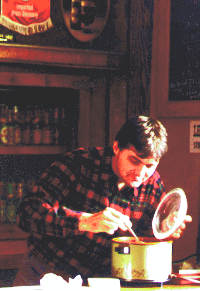|
American Beer Month
20 years of serving good beer
When Earle Johnson began working at Quenchers Saloon in Chicago in 1979 he surely didn't expect he'd still be there more than 20 years later, having witnessed a genuine beer renaissance.
He had a Masters of Divinity from McCormick Theological Center and was a ordained minister. He already had a solid background in the restaurant business when he started tending bar in the neighborhood where he lived, but he never left. He couldn't begin to count the number of customers he's introduced to beers beyond the mainstream.

Earle Johnson checks a batch of his famous chili in the early days at Quenchers. |
Johnson took a stake in Quenchers in 1980 and bought the bar outright in 1981. In those early days, he sometimes had the saloon to himself. "I'd sit there for hours at a time and not see a single customer," he said. "There was an old man who stopped in for a beer on his way home from work. Then I'd close up at 11."
But he built up a neighborhood following. "A group of neighborhood kids just turned 21 and adopted the bars as their own. They wanted a place that wasn't their father's bar. That was the key in the beginning," Johnson said. And he made Quenchers different by making offering a variety of beers.
"The trend at that point is they kept closing breweries," said Johnson. "We were moving to all mainstream beers. There wasn't much choice."
In 1981, Johnson had eight beers on tap, with Augsburger Light and Dark the leading sellers. Hamm's Dark was an exotic choice and the other taps usually went to imports.
Today Guinness and Newcastle Brown are still popular but most of the 16 taps pour microbrewed beer, the bulk of it from the Midwest. "I don't know if I had any hope (20 years ago) that there would be a place where I'd be able to stop and get a locally brewed beer," Johnson said.
Although Quenchers boasted a larger draft selection than most, it was the bottle menu that made the bar a beer destination in the early 1980s. "We'd get just about anything that came to town," Johnson said. He remembers dueling with a bar called Theresa's Red Door. "We'd have 45, then they'd have 46, then we'd get two new beers," he said.
"People were into trying things. We could sell about five cases of just about any beer," he said. "We'd have a Beer of the Week for $1 a bottle." Bud and Old Style sold for 75 cents a bottle.
Quenchers' first owner worked downtown in Chicago's Loop and the tavern served as an outpost for commuters on their way to the northern suburbs. Even as Johnson built its reputation as a beer outpost, it was mostly a neighborhood bar. As the fortunes of the neighborhood have fallen and risen, so has business.
"We're starting to see more movement of our total inventory," Johnson said. He remembers when the Belle-Vue fruit beers from Belgium were offered 15 years ago. "They languished," he said. Today sales of Belgian beers are robust. "Beer has gotten all kinds of media exposure," Johnson said. "It has opened people's ideas to what beer is."
At Quenchers, the old and new mix comfortably. The saloon is jammed with classic breweriana. The well-worn coolers are filled with a more interesting selection of bottles than ever, and blackboards above them list the menu of beers from around the world.
Johnson held a 20th anniversary party last August and hauled out scrapbooks with pictures of regulars and favorite bartenders. It was quite a three-day bash.
A few days later, there were new customers in the bar. "This is really something. How long have you been here?" one asked Johnson.
He simply gave her a straight answer.
"Twenty years," he said.
July 2000
| 
